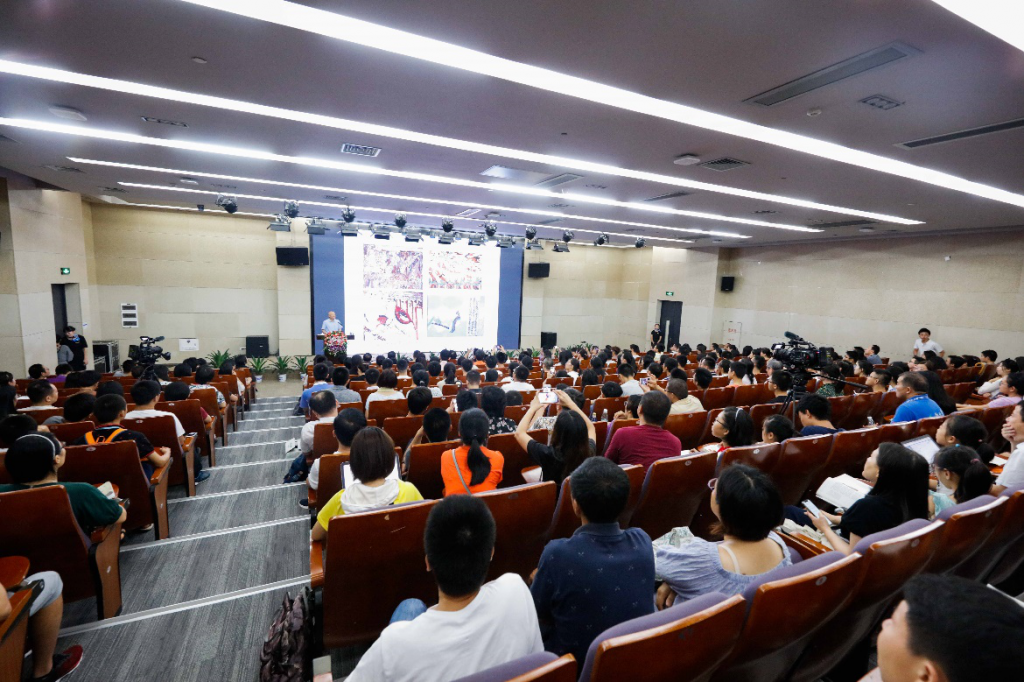On the morning of June 23, Director of Dunhuang Academy Wang Xudong delivered an engaging lecture titled “Examining Cultural Confidence through Dunhuang.” University Council Vice Chairperson Li Fengliang hosted the lecture. University Council Chairman Guo Yurong attended the event and awarded a certificate to Director Wang. Other attendees included Vice President Lu Chun, Chief Financial Officer Ye Qin, Residential College Director Han Wei, Research Office Director Zhao Yusheng, and representatives of various offices, departments, colleges, and research centers.

Despite the bad weather and the ongoing exams on campus, the lecture hall was packed with students, faculty members and history lovers from across Shenzhen. By first asking the audience why Dunhuang arts and culture could survive the harsh environment in Northwest China, Director Wang gradually analyzed the favorable geographical location of Dunhuang, such as being situated along the Silk Road and in an oasis with drinking water coming from snow-capped mountains nearby.
Wang Xudong then presented many murals of the Mogao Caves, which is the most impressive part of Dunhuang culture. While the audience enjoyed the visual impact of the murals, Wang elaborated on the cultural and philosophical significance behind the murals – especially the Buddhist life lessons told by these ancient paintings. Director Wang believed the thousand-year-long Dunhuang culture (AD 4th to 14th century) was a typical representation of the inclusiveness and multicultural orientation of Chinese history and culture. Despite some initial conflicts, Dunhuang culture eventually became a perfect blend of Greek, Persian, Hindu (particularly the spread of Buddhism), Western Chinese and Eastern Chinese culture.
Moreover, Wang Xudong talked about the research, preservation and partial rebuild of Mogao Caves since the foundation of the People’sRepublic of China. He also highlighted the role modern technology has played in present-day Mogao Caves tourism, such as interactive websites and crowd control systems. Wang stressed that Dunhuang culture is a perfect example of mutual promotion of cultural openness and culture confidence, and wants to help the Mogao Caves, Dunhuang City, and the Dunhuang Academy have a greater global impact in the near future.
Wang added that he was initially a STEM major scholar but was instantly drawn to the Dunhuang culture 27 years ago and has never looked back. He encouraged SUSTech students to discover the beauty of humanities and social sciences in their spare time.

About Dunhuang and the Mogao Caves:
Dunhuang is a county-level city in northwestern Gansu Province, Western China. It was a major stop on the ancient Silk Road and is best known for the nearby Mogao Caves, which is also known as the Thousand Buddha Grottoes or Caves of the Thousand Buddhas. The caves form a system of 492 temples 25 km southeast of the center of Dunhuang and contain some of the finest examples of Buddhist grottoes spanning a period of 1,000 years.
About the Speaker:
Mr. Wang Xudong (born 1967) is the Director of the Dunhuang Academy and the Research Center for National Ancient Murals Conservation Technologies. He is also a part-time professor and doctoral advisor of China’s Northwest University and Lanzhou University. Mr. Wang is also the Chairman of the Ancient Site Conservation Committee of International Rock Mechanics and Engineering Society, as well as the Stone Kiln and Earthen Site Protection Committee of the China Association for Preservation Technology of Cultural Relics.
Since 1991, Mr. Wang has been conducting research on the protection of stone kilns, ancient murals, and earthen site, as well as monitoring, forecasting, and preventive conservation of cultural heritage. He has led over 30 site operations or surveying of Major Historical and Cultural Sites Protected at the National Level, undertaken more than 20 national and provincial projects, (co-)organized four international projects, published over 80 academic papers and co-published seven monographs. Wang has received 15 national and provincial awards, got about a dozen patents and set up five national and industry standards.
Proofread ByChris Edwards
Photo ByZhang Haofan and Jiang Haiyang